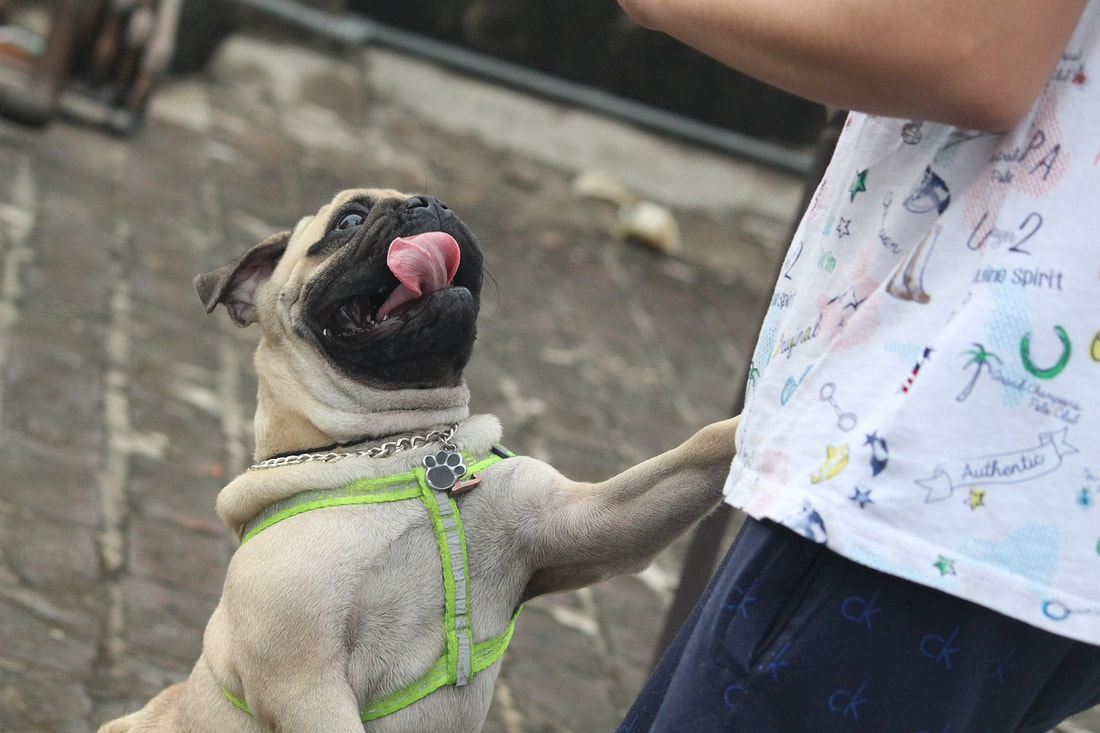Dogs are usually fond of jumping on people. It is a common behavior that some pet owners usually want to overcome. Fortunately, you can decrease jumping by changing your dog’s behavior. Below are some tips that will help you to train your dog to stop jumping on you.
Action and Consequences
The way you respond to your jumping dog is important. Through action and consequence you can ensure that your dog stops jumping. Your pet sitter can help reinforce such training while you are away.
In scenarios where your pet wants something such as food, to play with a toy, or your attention, your dog may be motivated to jump in order to get nearer to the object of desire.
To change your pet’s behavior, your dog should understand that jumping will not help to get what is desired but it would only make the object of desire to go farther away or even disappear.
For example, if your pet jumps on you while you are preparing the dog’s meal, you should not push your pet away. You should instead walk away from the food completely after ensuring that the food is not accessible to your pet. By removing the reward, your dog will be forced to try to use another strategy to get what is needed.
When your dog attempts to adopt an alternative behavior such as sitting, you should resume doing what you stopped, and reward your pet heavily for it. The more you or your dog walker rewards good behavior, your pet will frequently practice it hence in this case it will stop jumping.
The Process Takes Time
You cannot change your dog’s behavior overnight. In some cases, pet owners usually get frustrated because before seeing improvements in their pets behavior things first get worse. This should not be surprising because it is their dog's final attempts to act in a way that comes naturally to them when they want something.
However, you should be prepared to go through the process of changing your pet’s behavior and you should consistently use strategies that have a high likelihood of ensuring a lasting change takes effect.
There are several strategies that you should consistently adopt when your dog keeps jumping on you. For example, if your pet becomes excited and jumps on you, you should turn your back.
You should not push your pet off with your hands because your dog may assume that jumping gets them attention or that you are playing. Moreover, you should not knee your pet because it is dangerous and painful.
If you have turned your back on your dog once or twice and your pet is still jumping on you, you should let your dog know that the behavior is not acceptable by communicating verbally, and then walking away from your dog.
When your dog calms down, you should resume interacting with your pet. Similar strategies can be adopted in cases where your dog jumps on you when you go home, or on your friends, visitors, and even strangers.
If you want to stop your dog from jumping on you just remember that the best way to do so is by changing your pet’s behavior. The simple steps and strategies elaborated on above are effective in ensuring that dogs stop jumping on their pet owners.
If jumping is a behavior that you want to overcome, be patient and work with your dog and after sometime you can be assured that the problem will be solved.
Action and Consequences
The way you respond to your jumping dog is important. Through action and consequence you can ensure that your dog stops jumping. Your pet sitter can help reinforce such training while you are away.
In scenarios where your pet wants something such as food, to play with a toy, or your attention, your dog may be motivated to jump in order to get nearer to the object of desire.
To change your pet’s behavior, your dog should understand that jumping will not help to get what is desired but it would only make the object of desire to go farther away or even disappear.
For example, if your pet jumps on you while you are preparing the dog’s meal, you should not push your pet away. You should instead walk away from the food completely after ensuring that the food is not accessible to your pet. By removing the reward, your dog will be forced to try to use another strategy to get what is needed.
When your dog attempts to adopt an alternative behavior such as sitting, you should resume doing what you stopped, and reward your pet heavily for it. The more you or your dog walker rewards good behavior, your pet will frequently practice it hence in this case it will stop jumping.
The Process Takes Time
You cannot change your dog’s behavior overnight. In some cases, pet owners usually get frustrated because before seeing improvements in their pets behavior things first get worse. This should not be surprising because it is their dog's final attempts to act in a way that comes naturally to them when they want something.
However, you should be prepared to go through the process of changing your pet’s behavior and you should consistently use strategies that have a high likelihood of ensuring a lasting change takes effect.
There are several strategies that you should consistently adopt when your dog keeps jumping on you. For example, if your pet becomes excited and jumps on you, you should turn your back.
You should not push your pet off with your hands because your dog may assume that jumping gets them attention or that you are playing. Moreover, you should not knee your pet because it is dangerous and painful.
If you have turned your back on your dog once or twice and your pet is still jumping on you, you should let your dog know that the behavior is not acceptable by communicating verbally, and then walking away from your dog.
When your dog calms down, you should resume interacting with your pet. Similar strategies can be adopted in cases where your dog jumps on you when you go home, or on your friends, visitors, and even strangers.
If you want to stop your dog from jumping on you just remember that the best way to do so is by changing your pet’s behavior. The simple steps and strategies elaborated on above are effective in ensuring that dogs stop jumping on their pet owners.
If jumping is a behavior that you want to overcome, be patient and work with your dog and after sometime you can be assured that the problem will be solved.



